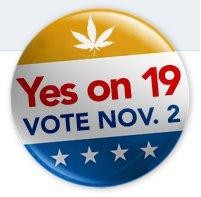
California’s Proposition 19 - the Regulate, Control, and Tax Cannabis Act – narrowly lost on election day. The final tally: 46.1% voted in favor and 53.9% against (the most successful results ever for a legalization initiative). Washington state’s two liquor privatization initiatives also faltered. Initiative 1100 (largely financed by Costco) lost in a close race, while Initiative 1105 (largely financed by liquor distributors) lost by double digits. Although there is no single answer for why voters didn't pass these measures, one common theme may be that the public wants state-level control when it comes to intoxicating substances. Let’s take a closer look at these races.
A variety of issues may explain why Proposition 19 did not succeed: fears of increased use and intoxicated driving, employer concerns, potential federal interference, and even opposition from parts of the medical marijuana community. There were also concerns with how the initiative was drafted, as it would largely leave commercial regulation and taxation up to cities and counties. As one article put it, “opponents say a vague, disorganized patchwork of regulations would ensue and lead to chaos for police and courts.” The prospect of passing a marijuana legalization law with such little clarity on how the drug would be regulated at the state level may have been too much for some voters.
Similar concerns may have been at play for Washington state’s liquor privatization initiatives. A main opposition talking point was that the initiatives would lead to increases in youth drinking, DUIs, and problem drinking because there would be so many more places to buy liquor, and private businesses would have greater incentive than state stores to boost sales. These certainly aren’t the only reasons people did not support the measures, state budget issues likely played a role. But, it does seem clear that the general public was unsure about turning over the distribution of liquor to the free market, perhaps due to a perception that the state does a better job of controlling these intoxicating substances.
So what’s the lesson for proponents of marijuana legalization, such as the ACLU of Washington? It may be that legalization proposals need to have clearly defined language and strong state regulatory provisions. Washington state Rep. Mary Lou Dickerson plans to reintroduce legislation in 2011 that would regulate, tax, and legalize marijuana. As she recently stated in the Western Front, it’s time to legalize and regulate “because we have a failed system of criminalizing marijuana.” Dickerson’s bill would task the Washington State Liquor Control Board with licensing farmers to produce marijuana for distribution through the state-run liquor stores. Maybe this is the type of tight state regulation that would play well with Washington voters? Time will tell.
Regardless of the outcomes of the most recent elections, marijuana law reform is forever changed and congratulations should be given to the proponents and supporters of Proposition 19. As Richard Lee (main backer of Prop 19) stated, “We have broken the glass ceiling. Prop. 19 has changed the terms of the debate.” Let’s hope so.




